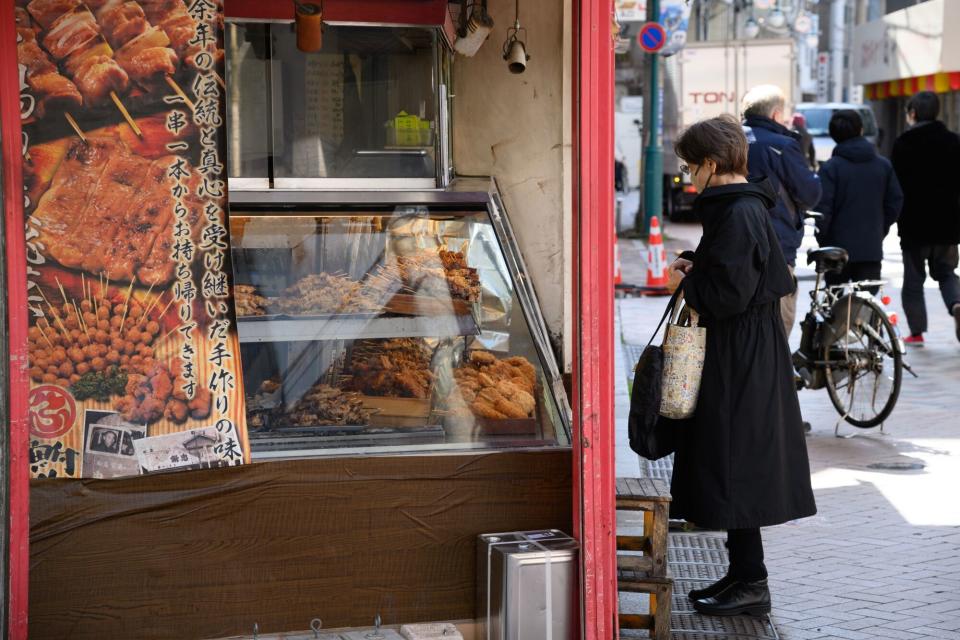Japan’s Households Boost Outlays for First Time in 14 Months
(Bloomberg) -- Japan’s households boosted spending for the first time in 14 months in a sign that private consumption may finally stop exerting a drag on growth as central bank officials prepare to discuss policy next week.
Most Read from Bloomberg
Real Estate Investors Are Wiped Out in Bets Fueled by Wall Street Loans
Billionaire-Friendly Modi Humbled by Indians Who Make $4 a Day
A Struggling Business Park Deals a Blow to Singapore's Regional Hub Ambitions
Real outlays rose 0.5% in April from a year ago, marking the first increase since February last year, the ministry of internal affairs reported Friday. The reading matched economists’ estimates. Spending fell 1.2% from a month earlier.
Categories that saw increases in spending included education, rents and clothing, while outlays on cars and food declined.
“Consumer spending is likely to pick up from here given wage increases and the government’s tax rebates,” said Hiroaki Muto, economist at Sumitomo Life Insurance Co. “I expect consumer spending to stop being a major drag for the overall economy soon.”
Friday’s data may indicate the tide is beginning to turn for Japan’s economy after private consumption fell for four straight quarters as real wages declined for more than two years, forcing workers to tighten budgets. Retirees living on fixed incomes have been hit especially hard, with consumer prices rising at or above the BOJ’s 2% target throughout that period.
Now chronic labor shortages are forcing companies to raise wages to attract new hires and retain workers. Annual wage negotiations between companies and unions resulted in pledges by large corporations to increase wages by more than 5%, the steepest increase in more than three decades. Some of those gains were reflected in wage figures earlier this week that showed base pay rising at the fastest clip since 1994.
It remains to be seen if smaller firms that employ the bulk of Japan’s company employees will follow suit, and whether those receiving higher pay will boost their spending. BOJ officials have expressed hopes that rising wages combined with measures including a tax rebate in June would spur spending.
The BOJ is waiting for evidence that a virtuous cycle linking rising wages to demand-led price gains is underway as it mulls the timing for another rate hike after ending its negative interest rate in March. Economists expect the bank to hold rates steady at the June 14 conclusion of the next policy meeting, with many predicting that move by October and a growing number seeing the risk it could happen in July.
Factors creating uncertainty for the spending outlook include the persistently weak yen, which has eroded the purchasing power for Japanese buying imports or pondering overseas travel. A decline in outlays on overseas package tours exerted a drag on the overall index in April. Consumer confidence dropped by the largest margin in more than two years in May.
BOJ Deputy Governor Ryozo Himino said in a panel discussion earlier this week that it’s important for authorities to monitor the impact of currencies on the broader economy, as a weak yen can affect imports in addition to having other affects. That echoes Governor Kazuo Ueda’s earlier remarks in which he signaled a willingness to take some action if currency moves affect inflation.
Another downside risk going forward is a fresh certification scandal involving Japan’s automakers including Toyota Motor Corp. and Mazda Motor Corp., which led them to suspend the delivery and sales of some types of vehicles. Finance Minister Shunichi Suzuki said the scandal and resulting output halt will have a significant impact on the nation’s economy.
(Updates with details from report)
Most Read from Bloomberg Businessweek
Sam Altman Was Bending the World to His Will Long Before OpenAI
David Sacks Tried the 2024 Alternatives. Now He’s All-In on Trump
Legacy Airlines Are Thriving With Ultracheap Fares, Crushing Budget Carriers
©2024 Bloomberg L.P.

 Yahoo Finance
Yahoo Finance 

